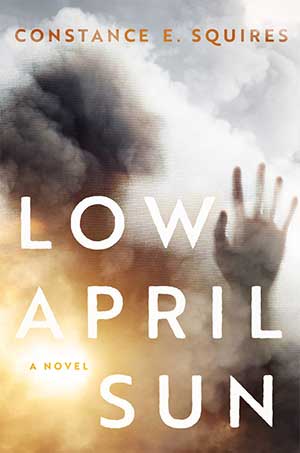No one’s Harmless, or All people Is: Constance E. Squires’s Low April Solar, by Paul Juhasz

Those that haven’t suffered trauma straight have a tendency to consider it as an occasion. It isn’t. Trauma is an environment; trauma terraforms, creates a brand new world through which one should relearn the right way to perform, the right way to proceed, and, finally, the right way to grasp the standard of therapeutic this new world presents. This fact applies irrespective of if the trauma is particular person or collective. Such is the content material and focus of Constance Squire’s new novel, Low April Solar (College of Oklahoma Press, 2025).
 The 1995 bombing of the Alfred P. Murrah Federal Constructing in Oklahoma Metropolis is the novel’s inciting incident. Because the narrative unfolds, the affect of this tragic occasion on 4 characters is explored: Edie, a recovering alcoholic; Keith, her husband, a playing addict but to hit all-time low however seemingly hellbent on getting there; Delaney, Edie’s half-sister and Keith’s then-girlfriend, lacking because the bombing, presumed useless however not formally listed as such since no stays had been ever recovered; and August, a self-harm addict, caught in an amber of his personal ritualized penitence, satisfied a single completely different resolution might need altered occasions on that horrible April day in 1995.
The 1995 bombing of the Alfred P. Murrah Federal Constructing in Oklahoma Metropolis is the novel’s inciting incident. Because the narrative unfolds, the affect of this tragic occasion on 4 characters is explored: Edie, a recovering alcoholic; Keith, her husband, a playing addict but to hit all-time low however seemingly hellbent on getting there; Delaney, Edie’s half-sister and Keith’s then-girlfriend, lacking because the bombing, presumed useless however not formally listed as such since no stays had been ever recovered; and August, a self-harm addict, caught in an amber of his personal ritualized penitence, satisfied a single completely different resolution might need altered occasions on that horrible April day in 1995.
The varied coping mechanisms of Edie, Keith, and August provide an exploration of the self-reflexive function of guilt and punishment. Their decisions are flawed, misguided, typically dangerously dysfunctional, however Squires treats these decisions, and the characters making them, with the sunshine, understanding contact of grace. Sure, our efforts to heal typically tangle us up in snares of our personal making. However now we have to do one thing. Low April Solar acknowledges and honors this compulsion with an unflinching, regular gaze.
Squires treats these decisions, and the characters making them, with the sunshine, understanding contact of grace.
Whereas Squires adopts the Murrah bombing as a jumping-off level, as context for her characters’ progress, the novel is just not primarily in exploring the query: “How can such horrific occasions occur?” (though some exploration, given that very same context, is unavoidable), tackling as a substitute the way more vital query (since such horrific occasions inevitably and invariably do occur, time and again): “What will we do now?” Squires’s deft dealing with of twin timelines—1995 and 2015—permit us to see how Edie, Keith, and August tackle that query, till a Fb pal request from somebody who might or might not be Delany seems. Scabs are pulled off, all-new questions have to be requested, and the form and type of therapeutic should reimagine itself.
As a result of Squires understands the complexities of her subject material, she steers away from solutions. The central query of “what will we do now?” isn’t tidied up; she avoids hole platitudes and neat, trite, and finally unuseful aphorism. The closest we come to a particular assertion on that central query is available in a midnovel dialog between Edie and August:
She pointed at a spot behind me. “We discovered the SUV she [Delany] drove over there. And her jacket,” she pointed to the center of the memorial, “was recovered over there. I at all times knew she died right here. Knew it. However now? I don’t know. Possibly these individuals who informed us they couldn’t rely her among the many useless had been proper to not. Possibly she’s not a sufferer.”
“However you’re.”
“What?”
“You’re.”
She seemed confused. “I by no means considered it that manner.”
From a craft perspective, the writing in Low April Solar is masterful. Completely paced character growth. Twin timelines distinctly separate however seamlessly blended. The string of plot connections ideally positioned—together with a brilliantly positioned Delaney chapter that whets the reader’s urge for food for solutions and accelerates the narrative tempo—to create an unfolding suspense that by no means feels constrained or tainted with a Dickensian arbitrary comfort. Squires treats her characters with a grace all of us need to be ours. Sure, her characters are flawed, however they’re additionally us. We acknowledge ourselves, our limitations, our foibles, our demand for inconceivable solutions, our ache and struggling in them, and since we do—and since the narrative in Squires’s arms calls for we do—we mix with them, level our gaze the place theirs is, see what they see, hope what they hope, despair when that shared imaginative and prescient turns into all too recognizably opaque.
Squires’s characters are flawed, however they’re additionally us.
However the novel means that opacity comes from asking the fallacious query. The title of the novel refers back to the setting of a second of readability for Edie, when the query of “why” morphs into the relevance of “who,” together with all of the obligations and tasks that include that phrase. It’s not a query of the tragedy or the trauma, however of how we outline ourselves in relation to tragedy or trauma. Low April Solar is, past all else, an vital ebook as a result of it reaffirms the significance of “who,” the important signification of the phrase. For you. For me. For everybody. For someplace in that phrase lies fact. And in that fact lies, in flip, the therapeutic we search.
Oklahoma Metropolis

0 Comment